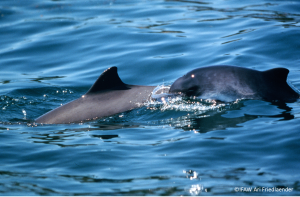
MCR have joined forces with ZSL once again to undertake an acoustic and visual survey for harbour porpoises of the Thames Estuary. Following on from the first ever dedicated study of porpoises undertaken by the team on Song of the Whale in 2015, the latest survey in April 2022 reported high encounter rates of porpoise in the Thames Estuary, with 31 individual detections of porpoise groups and 16 sightings (of these encounters, seven were both seen and heard).
The results of the study (presented in a new report published today -16th August) confirm the Thames Estuary is an important habitat with significant densities of porpoises present in the outer estuary. The porpoise numbers recorded in the Thames this year, and in 2015, are comparable to those recorded in marine protected areas elsewhere in Europe.
In 2019, five Special Areas of Conservation (SACs) were designated in the UK as areas of importance for harbour porpoises, including the Southern North Sea, which is the largest UK (and European) SAC, and is located to the east of England. Much of the site lies offshore (except some coastal waters of Norfolk and Suffolk); It does not include the Thames estuary. Ongoing rapid developments in the Thames Estuary may be a cause for concern, given the declines in densities of harbour porpoise documented in other regions.
MCR support ZSL’s call for greater protections for Europe’s smallest whale in the Thames estuary, one of the UK’s busiest waterways, as our studies show that the Thames is an important habitat for harbour porpoises over a number of years. This study will hopefully inform future conservation actions for this elusive marine mammal and provide evidence for the need for wider coastal and estuary protection in the UK. We are all delighted to discover that porpoises are still utilising the Thames estuary in significant numbers, highlighting the importance of estuaries for this charismatic British marine mammal, and emphasising how important it is to prioritise baseline research and monitoring of protected species in other little-studied UK coastal waters.
Sorry, comments are closed for this post.